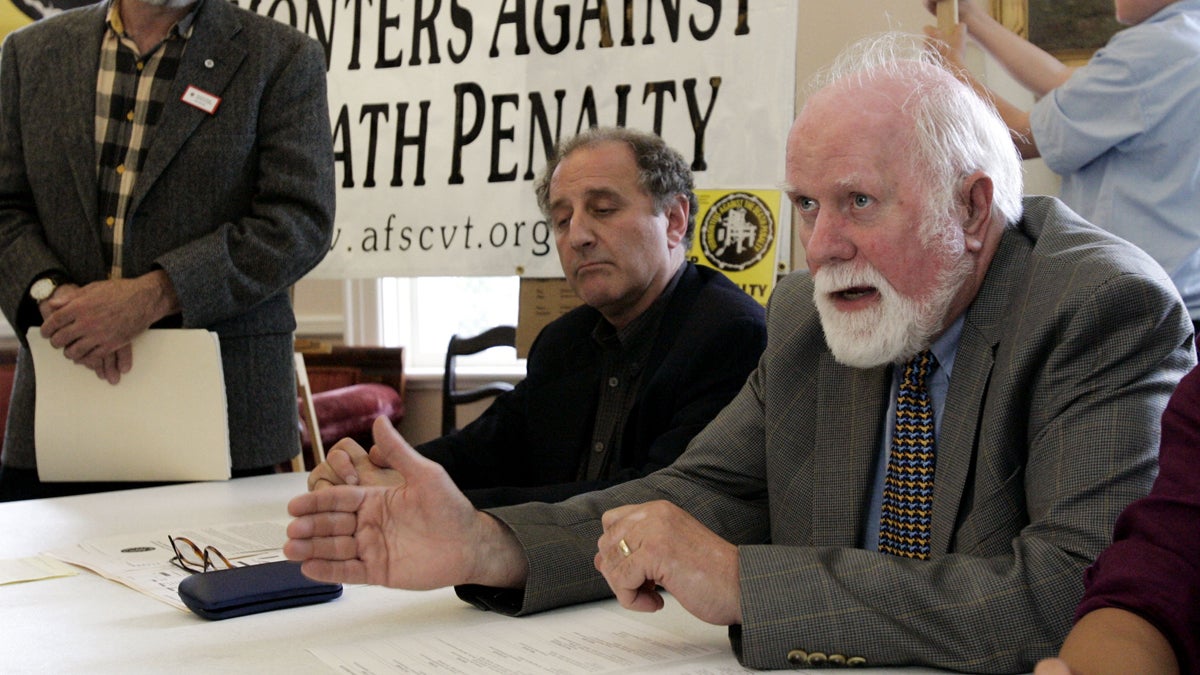End the death penalty and redirect savings to programs that help victims

Rev. Walt Everett (right) tells of forgiving his son's killer at a conference opposing the death penalty at the Unitarian Church in Burlington, Vermont, in 2006. (AP Photo/Alden Pellett, file)
When my 24-year-old son Scott was murdered in 1987, I was devastated. Losing a loved one to murder tears apart the lives of the surviving family members, but I’ve come to realize that the death penalty does very little to help victims’ families heal.
When my 24-year-old son, Scott, was murdered in 1987, I was devastated. Losing a loved one to murder tears apart the lives of the surviving family members, but I’ve come to realize that the death penalty does very little to help victims’ families heal. For many victims’ families, the death penalty traps them in a decades-long cycle of uncertainty, court hearings, and waiting.
By getting rid of the death penalty, we could free up millions of dollars that could be redirected to programs that will actually help victims’ families, such as grief and trauma counseling, compensation for lost income, and other much-needed services.
When New Mexico replaced their death penalty with a sentence of life without parole, they were able to redirect the savings to provide support to children of murder victims, provide services and programs to murder victims’ families, and create a murder victims’ family services fund. They were also able to pass another measure that requires employers to provide time off for victims’ family members to attend judicial proceedings.
Forgiveness is not easy
Since my son’s murder, I have worked to eliminate the capital punishment. I have spoken in 20 states and the District of Columbia about my experience of losing a son to murder, and being prodded by God to forgive the person who killed Scott. But forgiveness and healing didn’t happen overnight, and it was not an easy process.
For almost a year after Scott’s murder, my emotional state moved from rage to depression. I found it extremely challenging to fulfill my role as pastor of a United Methodist Church. I couldn’t believe that one individual could do so much harm to my family, and I wanted him punished for a long, long time.
I went to the sentencing hearing for my son’s killer filled with anger, but something unexpected happened. The killer, Mike Carlucci, apologized for what he had done. Something in my heart told me he was sincere. If I had not heeded God’s call to forgive, I would very probably be dead by now — if not physically, at least emotionally and spiritually.
Death penalty fails us
When I heard Governor Wolf’s announcement that he was halting all executions in Pennsylvania until concerns about the fairness of the state’s death penalty system can be addressed, I was once again reminded why the death penalty fails us all.
Study after study shows that capital punishment is not a deterrent to murder and that it is far more costly than the alternative of life in prison without parole. Nationwide more than 150 men and women, including six from Pennsylvania, have been released from death row after new evidence emerged demonstrating that they had been wrongfully convicted. There are insufficient protections in place to protect against the wrongful execution of innocent men and women.
Pennsylvania has established a study commission to take a closer look at the administration of the death penalty in this state, including the problem of wrongful conviction. It just makes sense to halt executions until the commission has finished its important work and its recommendations can be considered and implemented.
It’s my hope that Pennsylvania will realize that the death penalty simply can’t be fixed, and will follow New Mexico’s lead in replacing the death penalty with life without parole and redirecting the savings to programs that will actually benefit victims’ family members.
—
Rev. Walt Everett lives in Lewisburg, Pennsylvania.
WHYY is your source for fact-based, in-depth journalism and information. As a nonprofit organization, we rely on financial support from readers like you. Please give today.

